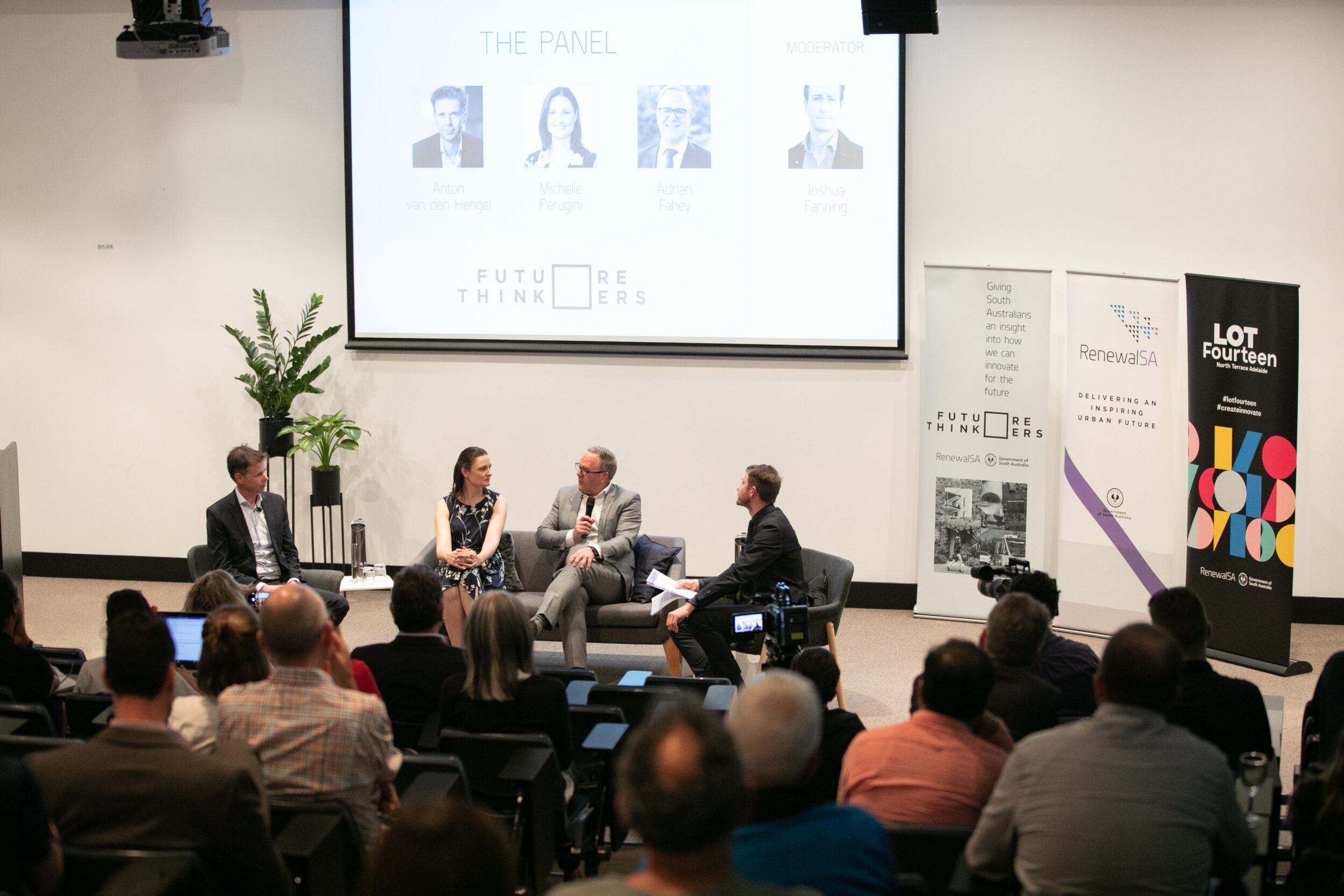Greater investment needed in AI, robotics
Posted November 26, 2019

Australia needs to make greater investment in AI and robotics to ensure that our workforce and economy can make the most of the enormous potential offered by these technologies.
That was from a panel of leaders in the field who spoke at a recent Future Thinkers event held recently at Lot Fourteen innovation neighbourhood – Professor Anton van den Hengel of the University of Adelaide’s Australian Institute for Machine Learning, Dr Michelle Perugini, Co-Founder and Chief Executive of Presagen and Life Whisperer, and Adrian Fahey, Chief Executive of SAGE Group.
Professor van den Hengel was the keynote speaker at the event, entitled “Are Robots Taking Our Jobs?”.
It was part of a Future Thinkers series being presented by Renewal SA to help inspire a more connected, creative and innovative future in South Australia. The series offers public talks featuring industry leaders and innovators who can give South Australians an insight into how the future may look in many aspects of our lives, including employment, urban living and technology. Future Thinkers – Are Robots Taking Our Jobs? was facilitated by CityMag editor and publisher Josh Fanning and supported by Lot Fourteen.
The AIML is Australia’s largest machine learning research group and will soon be joining the Lot Fourteen innovation neighbourhood.
Professor van den Hengel said Australia was ideal for the development of AI because it had great data, quality of life, an educated and adaptable workforce, and trustworthy institutions in a liberal democracy but it was failing to adapt and invest in research.
“The real risk to Australian jobs is that we will miss the revolution,” he said.
“The arms race at the moment is about getting the best people in the world because the opportunities come from people with really strong technical skills.”
He said a survey of 1000 organisations which had adopted AI found that four out of five executives said the technology had created new job roles, while two in three executives said it had created new jobs.
“Blue sky research is there the global disruptors come from. Change now is not incremental, its disruptive,” Professor van den Hengel said.

Professor Anton van den Hengel of the University of Adelaide’s Australian Institute for Machine Learning delivering his presentation
He said the AIML had recently won a challenge on the use of AI to diagnose conditions such as diabetes and heart disease by analyzing retinal images, which meant that people living in developing countries could be diagnosed for life threatening diseases at a very low cost per patient.
Dr Perugini is an academic, entrepreneur and internationally renowned expert in health, medical research, and advanced analytics technologies. She has a PhD in medicine and was a stem cell biologist for a decade. Presagen co-creates scalable AI products with clinics around the world while preserving data privacy and sharing the commercial value. Presagen’s first product is Life Whisperer, which uses AI to help clinicians select viable embryos to improve outcomes for couples wanting to have children via IVF. Both companies are based at Lot Fourteen.
She said there were many economic gains to be made from utilizing AI.
“It’s about building something really practical that people can see the benefits of and solving problems that don’t have a solution,” she said.
“My view is that AI is about augmenting and improving current processes.”
Dr Perugini said disruptive technologies cut across all industries, requiring a multidimensional skill set.
“The meeting of minds and collaborative approach builds the best technologies,” she said.
“Collective intelligence is the thing that only humans can do – robots focus on very singular tasks.”
Adrian Fahey is the CEO of SAGE Group, which includes SAGE Automation, Nukon, Embedded Expertise and Skills Lab, and is an Australian leader in industrial automation, control systems and associated services. The group is based at Tonsley Innovation District.
Mr Fahey is responsible for developing and executing the strategic plan for the business and has led the growth of SAGE over the past 25 years from $44 million to $98 million. It has a team of more than 450 people across 13 offices and five companies.
SAGE Automation is behind a range of critical infrastructure facilities in South Australia, from the water that flows from our taps to traffic management systems.
“We have been installing robots in industry for many years,” he said.
“It’s taking away the three D’s – the dirty, the dull and the dangerous jobs. These are the jobs that typically you don’t want humans doing.
Mr Fahey said the workforce was being transformed and people who had been displaced by robots were retrained to train and support the robots.
“Our biggest needs are for trades and technical people, for example, electrical tradespeople to work in the field to support robots,” he said.
View the entire Future Thinkers event on robotics below:
Great things come to those who subscribe
Subscribe
"*" indicates required fields
Adelaide 5000
Developed by Frame Creative
Design by The Sideways Theory
Design by Sixth Street Design
Developed by Frame Creative
© Lot Fourteen All Rights Reserved

